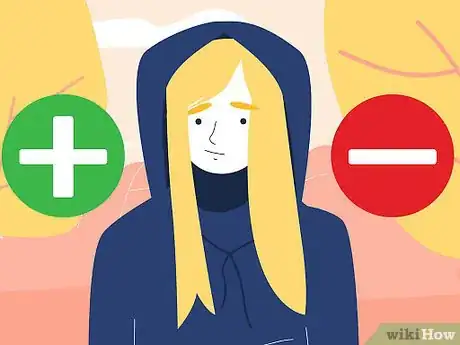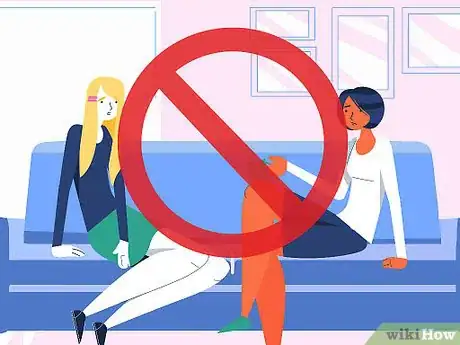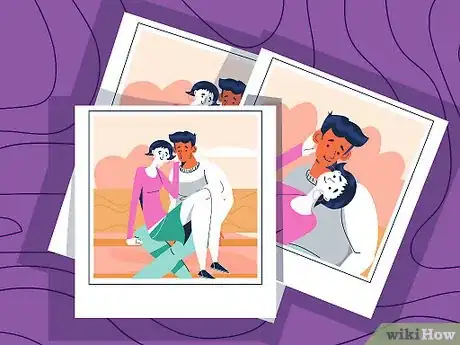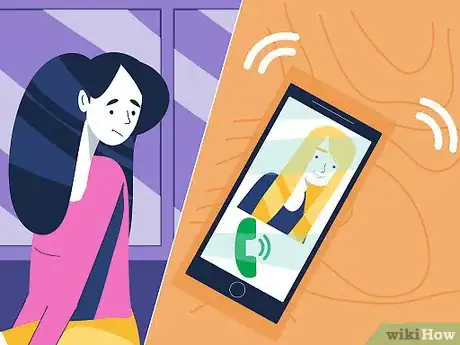This article was co-authored by Klare Heston, LCSW. Klare Heston is a Licensed Independent Clinical Social Worker based in Cleveland, Ohio. With experience in academic counseling and clinical supervision, Klare received her Master of Social Work from the Virginia Commonwealth University in 1983. She also holds a 2-Year Post-Graduate Certificate from the Gestalt Institute of Cleveland, as well as certification in Family Therapy, Supervision, Mediation, and Trauma Recovery and Treatment (EMDR).
There are 8 references cited in this article, which can be found at the bottom of the page.
This article has been viewed 211,656 times.
Can you think of a more awkward and uncomfortable situation than knowing your friend’s partner is cheating and deciding if and how you should tell? Probably not. It may seem like a clear-cut situation, but there’s a lot to consider before sharing what you know. Start by making sure you really need to break the news. Then, have a compassionate conversation with your pal. Afterwards, be sure to care for yourself emotionally, mentally, psychologically and physically, if the fallout is negative.
Steps
Making the Decision to Tell
-
1Be sure. Before you jump the gun and start dialing your friend to tattle, make sure what you saw was actually cheating. You’ll stir the pot for no good reason if it turns out your friend’s partner is simply having lunch with a coworker or a distant relative. Carefully evaluate what you saw just in case you are reading into something completely innocent.[1]
- Was there hand-holding, hugging, or kissing involved? What about the interaction makes you think your friend’s partner is cheating?
-
2Get firm evidence. If you are absolutely sure the interaction falls under the category of infidelity, get proof. You may not have to use this. But, it’s better to have proof, just in case you decide to share the info and just in case your friend doesn’t believe you.
- You might take a picture or record a video of your friend’s partner with their illicit lover.
- Be discreet, if you decide to do this.
Advertisement -
3Consider what you know about the relationship. You must be willing to acknowledge the idea that your friend and their partner have an open relationship. Such relationships, in which both partners agree to date other people, are becoming increasingly more common. You could be assuming their partner is cheating, when they actually have permission to see other people.[2]
- Some people in open relationships have an understanding between one another but may not share the dynamics of their relationship with family or friends. Your friend may be perfectly okay with their partner dating someone else--they just may not have told you about it.
- Sticking your nose in their relationship business could put both you and your friend in an awkward position.
-
4Weigh the pros and cons. Consider the ramifications of sharing what you know. You might automatically feel like telling is the “right” thing to do, but it may not be what’s best for your friend. Spend some time pondering the ups and downs of telling them.[3]
- Make a pros and cons list that outlines the positives and negatives associated with breaking the news to your friend. A pro might be “She’ll know her partner’s unfaithful.” Cons might include “She’ll be angry at me for delivering the news” or “She is already fragile from being cheated on in the past. The news will ruin her.”
-
5Put yourself in your friend’s shoes. Another way to make this decision is by using empathy. Ask yourself what your friend would do if they were in this position. Consider what you know about your friend, their personality, and their beliefs.[4]
- Are they a champion of being honest? Do they have trouble believing anything negative about their partner?
- Use what you know to consider how your friend might respond to the news and whether telling is the best decision.
-
6Avoid telling other mutual friends. Your first impulse may be to call up another pal and tell them what you know. You may not do this to spread gossip necessarily, but to get their advice. Don’t. It may feel good to share the burden with another friend, but it’s disloyal. Avoid discussing your friend’s personal business with anyone else who knows them or their partner.[5]
- Talking to another mutual friend could start the rumor mill. It may also create drama if your friend decides not to act on the information.
Talking to Your Friend
-
1Choose the right time and place. Disclosing sensitive information to a friend is distressing enough. Avoid doing it right away or when you are still angry. Wait until you have calmed down and decided what you will say. Choose a time when you and your friend are alone.[6]
- Instead of breaking the news in a public place such as a restaurant that may feel like a fishbowl to your friend, go somewhere private like a park bench or a quiet courtyard.
- Don’t talk to your friend at a time when or at a place where their partner could walk in on the conversation.
-
2Approach the topic by asking about the relationship. You might ease into the topic by asking your friend how the relationship is going. Starting here may also give you an opening to bring up the infidelity.
- For example, you might say, “How are things with you and Brittany?” Use your friend’s response to determine how you approach the subject.
- If they believe things are good, you might say, “Hmm…Well, maybe I misread the situation…”
- If they admit things have been rocky, you might say, “I’m sorry to hear that, but that’s why I wanted to talk to you…”
-
3Speak with compassion. Be forthright and considerate when you divulge that your friend’s partner is cheating. Use a soft, caring tone. You may also take your friend’s hand or rub their shoulder as you share the news.
- It may be appropriate to say something like, “This is really hard for me to do, but I felt a duty to share this with you. I saw Hank with another woman the other day. They were having lunch in the city.”
-
4Ask if they’d like to see your evidence. Don’t automatically assume your friend wants to see proof. They may need to process the news before being forced to see pictures or watch a video. Let them know that you have it, if they’d like to see it.[7]
- You might say, “I couldn’t believe what I was seeing so I took a picture. I have it, if you’d like to see.”
-
5Try to head off a rift in the friendship. Your friend may be overcome by a lot of emotions once you share the news about the cheating. They may associate these feelings with you and try to get distance. It may be smart to go ahead and call out what you think they might do and ask them not to.[8]
- For example, you might say, “We’ve been friends for years, so this was really hard for me to do. I don’t want to see you hurt, but it wouldn’t feel right to keep this from you. I know you might want to push me away or “shoot the messenger.” Please, don’t. Whatever you decide to do with this information, it’s up to you. But, please let me be here for you.”
Caring for Yourself after the Talk
-
1Assume your friend may distance themselves. Even if you plead with them not to push you away, your friend may still do so. They may want space from you, as the bearer of bad news. Plus, if they choose not to leave their partner, they may prefer not to be reminded of the cheating by seeing or talking to you.[9]
- Signs of avoidance might be that they stop answering your phone calls or constantly be "busy" when you try to make plans.
- Expect that they might react this way and know that there isn’t anything you can do about it.
-
2Vent to an unbiased friend. It may help to talk the situation over with someone you trust after you’ve told your friend. You might decide to do this if you are hurt by their reaction towards you or if you simply need advice about how to move forward. Be sure to choose someone unrelated to the situation who doesn’t’ know your friend or their partner.[10]
-
3Perform self-care. Be gentle with yourself and keep in mind that you did what you thought was best for your friend. Don’t beat yourself up if they seem to resent you for telling. Take some time to nurture your physical and mental health and well-being.[11]
- While you may regret telling your friend because of the stress and conflict it has caused, remember that withholding such important information from your friend may have been just as stressful.
- Be sure to get plenty of rest, eat nutritious meals, and get regular exercise.
- You might also perform calming activities like visiting a spa, meditating, taking a warm bath, reading a book, or going for a hike outdoors.
Warnings
- Be cautious in your approach, as your friend might turn their anger, sadness, and frustration on you if they cannot handle the information that you share.⧼thumbs_response⧽
References
- ↑ http://lifehacker.com/what-to-do-when-you-think-a-friend-is-being-cheated-on-1724532688
- ↑ http://www.self.com/story/open-relationship-stories-rules-questions-people-ask-me
- ↑ https://www.psychologytoday.com/blog/maybe-its-just-me/201008/should-you-tell-your-friend-his-or-her-partner-is-cheating
- ↑ https://www.psychologytoday.com/blog/maybe-its-just-me/201008/should-you-tell-your-friend-his-or-her-partner-is-cheating
- ↑ http://www.independent.co.uk/life-style/love-sex/do-i-tell-my-friend-their-partner-is-cheating-on-them-a6697171.html
- ↑ https://www.psychologytoday.com/blog/fulfillment-any-age/201507/5-ways-deliver-bad-news-minimum-pain
- ↑ http://www.huffingtonpost.com/entry/how-to-respond-when-someone-you-know-is-cheating_us_55c107a7e4b0a50ad0aaa9b3
- ↑ http://www.huffingtonpost.com/shasta-nelson-mdiv/cheating-tell-a-friend_b_1665757.html
- ↑ http://www.huffingtonpost.com/shasta-nelson-mdiv/cheating-tell-a-friend_b_1665757.html
About This Article
Telling your friend that their partner is cheating can be really tough, but if you break the news in the right way, you should make it a little easier for them. Before you tell your friend, make sure what you saw was actually cheating and they’re not in an open relationship. It’s best to wait until you’re calm and your friend’s not too busy or stressed to tell them. It will be a big blow so try to be as gentle as possible. For example, say something like, “I’m really sorry to have to tell you this, but I think you deserve to know the truth. I saw your partner kissing someone else at the park a few days ago.” If you have evidence, like a photo or screenshot, ask if they’d like to see it. For more tips from our co-author, including how to deal with a friend who’s cold towards you after you break the news, read on.










































































